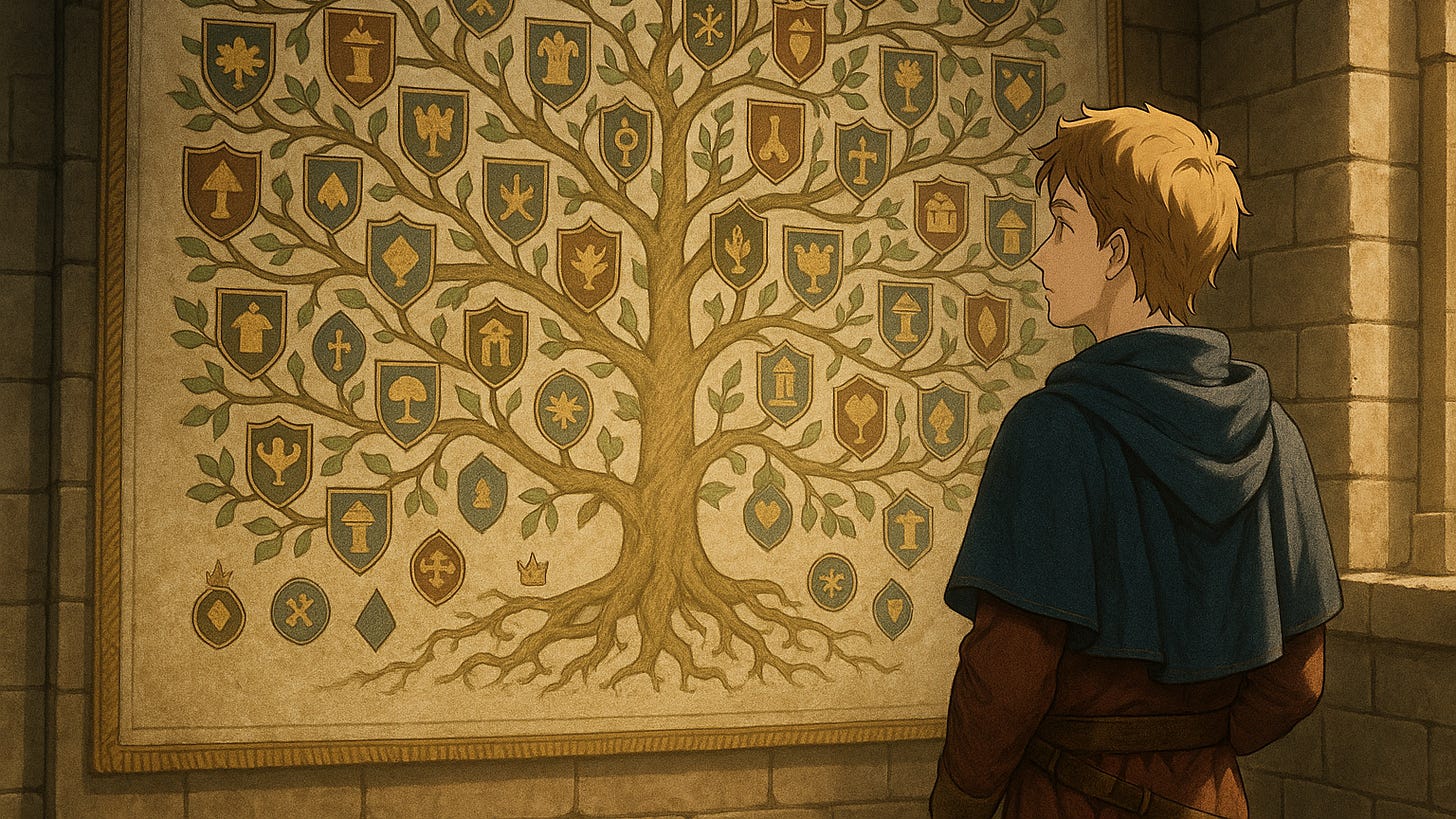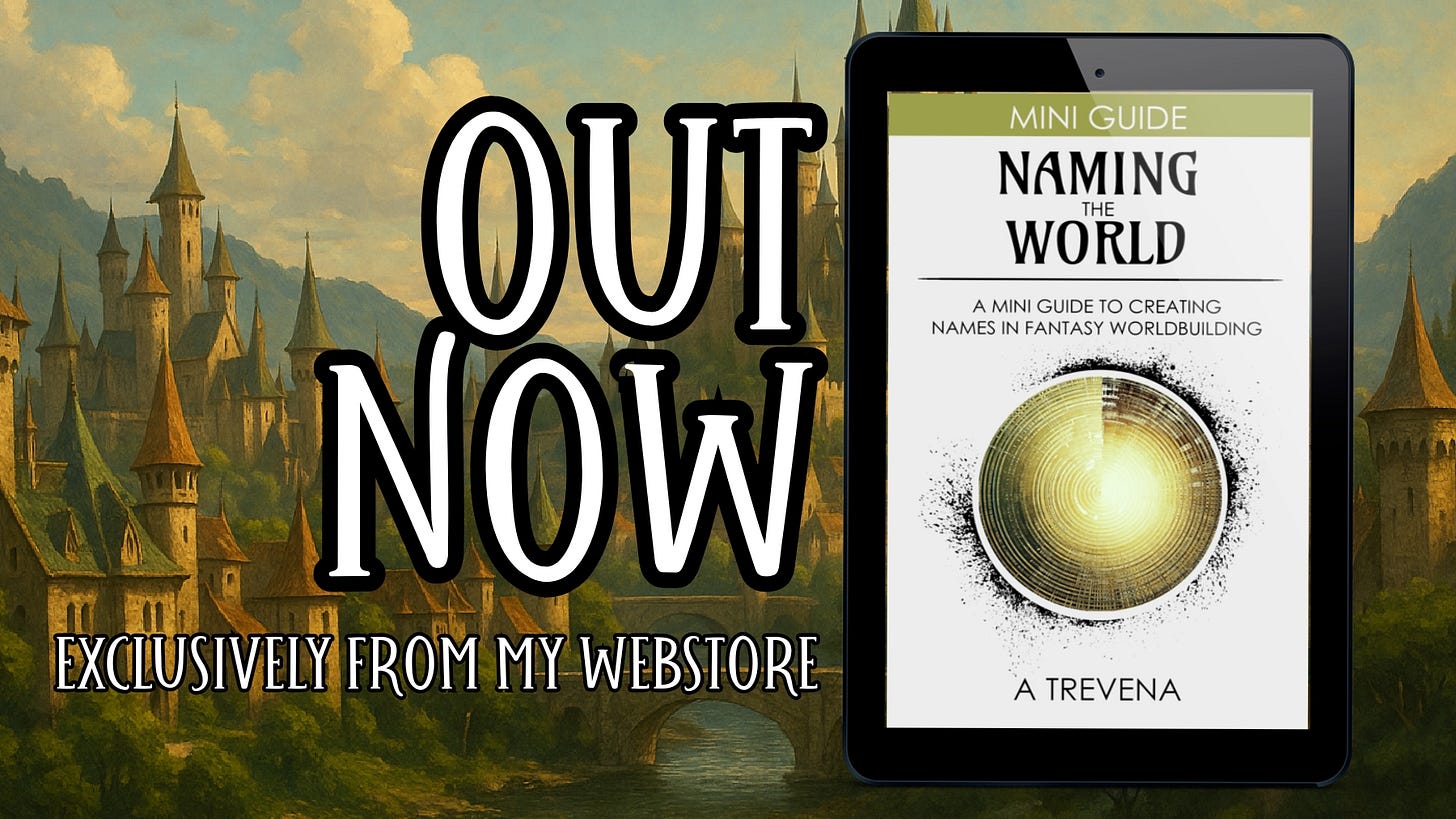A good name stands out. A good system of names ties your world together. But you don’t need to invent an entire language to give your world believable, recognisable naming conventions.
A few well-chosen patterns—repeating sounds, suffixes, structures, or themes—can create a sense of linguistic cohesion without the work of building a full conlang.
The Music of Shared Sounds
One of the easiest ways to establish a naming pattern is through sound. Repeating certain vowels, consonants, or rhythm structures help names feel like they come from the same linguistic family.
Names like Elira, Seren, and Kaelith all feel like they belong together; soft vowels, lilted endings, and a hint of elegance.
Grask, Droven, Murng suggest something rougher; maybe goblinoid, dwarvish, or gritty frontier folk.
Zayana, Ravari, Nelaira might come from a region with fluid, musical tones, possibly magical or noble.
You don’t need to know the language behind these names. The pattern does the work for you.
Even just repeating one or two elements like a common suffix or a favourite consonant pairing can go a long way. Names don’t need to match perfectly. Just enough to feel related.
Prefixes, Suffixes, and Building Blocks
Inventing a few naming ‘building blocks’ gives you lots of flexibility while still maintaining structure.
Prefixes like Al–, Ka–, or Vel–
Suffixes like –an, –ith, –ar, –ek, or –wyn
Name compounds like Stone–, Ash–, Bright–, Thorn–
Suddenly, you can generate a wide range of names that feel like they come from the same world:
Velan, Velith, Vellor could all come from the same region.
Ashra, Ashwyn, Ashthane could be members of the same family line.
Kaelith, Kaerin, Kaelis could be variations across generations or dialects.
This is especially handy when naming across regions, noble houses, or magical traditions. You can vary names just enough to show evolution or distinction, while keeping the link intact.
Cultural and Regional Variation
If your world has multiple cultures, think about how naming patterns might change between them.
Maybe one region uses long, flowing names with multiple syllables while another prefers patronymic endings like –sen or –dari. Vowel-heavy names might reflect a melodic spoken language, as opposed to one-syllable names with hard consonants.
When your readers encounter these names, they won’t just sound different, they’ll feel like they belong to different people, shaped by different cultures, values, and languages.
Family and Lineage Patterns
Some cultures might structure names around family identity. This can take many forms:
Shared roots across generations: Thalen, Thalira, Thalwyn.
Familial surnames: Darron Avedrin, Kael Avedrin, Mira Avedrin.
Name orders that mark status: First-name, Clan-name, House-name.
Place-based names like Edris of Farstone, Jel Ar-Methor.
You might even include earned names or rites of passage that cause a name to change, creating before-and-after identities. This opens up a lot of story potential while reinforcing how names function within your world.
Avoiding the Patchwork Problem
One of the most common pitfalls in fantasy naming is inconsistency. When names sound like they come from wildly different worlds, it can break immersion.
For example, a party of adventurers named Kael, Bubbles, Therandur, and Steve can work for comedy, but in a serious setting, it might feel like someone shuffled characters from four different worlds into one.
It’s fine to vary name styles across cultures, regions, or species, but make sure there’s a logic behind it. Even when names are borrowed, mangled, or blended, they should still reflect your world’s history and tone.
If something sounds jarringly out of place, ask: would this name exist in this society, with their values and language patterns?
Finding Your Naming Voice
You don’t need to plan every detail in advance. But once you’ve written a few names, stop and look at them as a group. Do they feel like they belong in the same world Could you guess where each one came from, or what role they hold? Is there a sense of rhythm, repetition, or cultural logic tying them together?
If not, tweak. Add a suffix. Drop a vowel. Shift one name closer to the others. Let them speak to each other. Worldbuilding through naming isn’t about perfection. It’s about cohesion. Even a little consistency goes a long way.
You don’t need a full conlang. Just a pattern.
Thank you so much to everyone who’s already picked up their Naming the World ebook from my webstore, you’re amazing!
By buying direct, you not only got your copy weeks before the general release, you’ve also supported me in the most direct way possible. Every purchase here means more of your money goes straight into creating more books, guides, and resources for you, rather than handing a slice over to a huge corporation. It genuinely makes a difference, and I’m so grateful to everyone who chooses to support me this way.





Yes, I love layered meanings like that. And for readers who don't make the connection, they can still enjoy exploring that world with all of its weird and unusual names.
Great post! I also recommend borrowing words from historical cultures or shared cultural touchstones to trigger subconscious associations that readers may have.
Robert E. Howard did this for names in his Conan stories. His place names evoked specific historical associations using minimal words, allowing him to focus his stories on the action that drew readers in. For example "Stygia", which calls to mind the Greek mythological River Styx, is full of musty tombs; while "Aquilonia", which evokes the Latin word for eagle, is full of imperial splendor. Now, it's easy to go overboard with this technique, and you don't want your names to feel too cliche or derivative, but this is a good way to quickly conjure an association using minimal words.
For example, I recently named a undead-run feudal empire in my D&D setting the "Helsingfyrd Pact". The word "Helsingfyrd" hints at the undead and martial themes of the realm. Breaking it down, you have "Helsing", as in Abraham Van Helsing, a character from Dracula; and "fyrd", which is an Old English word for an army. Without any added description, the phrase "Helsingfyrd Pact" (in my head at least) immediately conjures up something cold, old, martial, vampiric, and sinister.